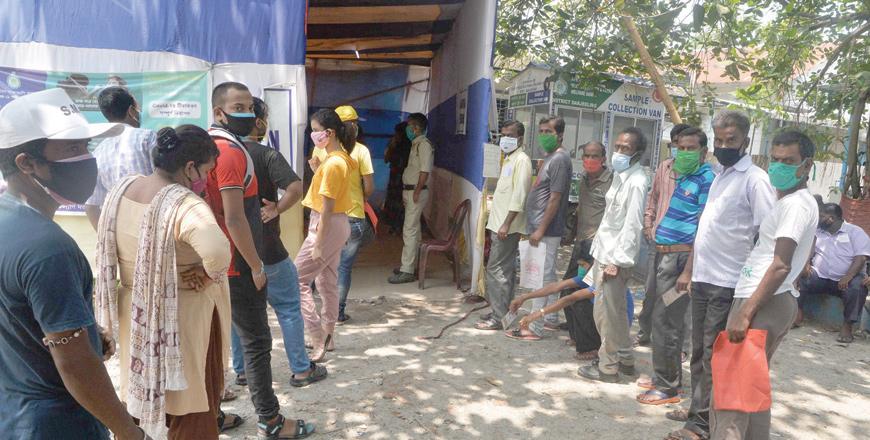You are here
Covax raises $2.4 billion to help combat jabs shortfall
By AFP - Jun 02,2021 - Last updated at Jun 02,2021

People over 18-year-old wait to receive a dose of the Covishield vaccine against the COVID-19 coronavirus at a primary health centre in Siliguri on Wednesday (AFP photo)
GENEVA — The Covax vaccine programme secured another $2.4 billion from donors on Wednesday, but underlined it was still struggling to get enough doses to help poorer countries fight the COVID-19 pandemic.
The scheme is trying to get enough vaccines for 30 per cent of the population in 92 of the poorest participating territories — 20 per cent in India — with donors covering the cost.
But despite raising more than the $2 billion it was looking for, the programme's leaders said the major challenge was getting the doses after supplies from the Serum Institute of India (SII) plant dried up.
"Our early secured supply has faced serious, severe disruption as a result of the terrible second wave in India that is consuming all of that country's production — to the point where by the end of June we'll be facing a shortfall of 190 million doses," said Seth Berkley, chief executive of the Gavi vaccine alliance.
Covax has already delivered nearly 80 million doses to 127 territories, with AstraZeneca shots making up 97 per cent of doses supplied so far — the rest being Pfizer-BioNTech.
The SII, producing AstraZeneca doses, was to have been the backbone of Covax's supply chain. However, New Delhi restricted vaccine exports to combat the devastating domestic surge.
SII said last month it was targeting resuming Covax deliveries by the end of the year.
But the plant's chief executive Adar Poonawalla was more optimistic on Wednesday, saying: "As soon as the situation in India improves, we hope to resume supplies to Covax over the next few months."
At Wednesday’s meeting, countries pledged to donate more than 54 million vaccine doses to lower-income nations to try to bridge the supply problems.
“We need all countries that have doses to share a portion of them with Covax now, so we can get them into the arms of those that are most at risk,” said Berkley.
The total number of shared doses pledged now stands at more than 132 million.
“The critical issue is going to be the timing and trying to get those as soon as possible,” Berkley told reporters.
The virtual donors’ summit was co-hosted by Japanese Prime Minister Yoshihide Suga and Gavi chair Jose Manuel Barroso.
The $2.4 billion raised brought the total sum available to procure vaccines to nearly $9.6 billion, said Barroso.
“We have achieved the goal of securing at least 1.8 billion doses” for the poorest 92 territories, Suga added.
The new financial donations included $800 million from Japan, $300 million from the private sector, $185 million from Canada, $140 million from Switzerland and $120 million from France.
Value of vaccines
Covax is co-led by the World Health Organisation, Gavi and the Coalition for Epidemic Preparedness Innovations.
CEPI chief Richard Hatchett said the value of COVID-19 vaccines in breaking chains of transmission, preventing hospitalisation and saving lives was now “indisputable”.
But, he added, the deadly surge in India was a “sobering and terrifying reminder of what this virus is capable of”.
Covax was set up to combat the likelihood of rich countries buying up most available vaccine doses — which is what has happened.
Overall, nearly 2 billion doses of COVID-19 vaccines have been injected in at least 215 territories around the world, according to an AFP count.
But some 38 per cent of the doses have been administered in high-income countries accounting for 16 per cent of the global population.
And just 0.3 per cent of them have been administered in the 29 lowest-income countries, home to 9 per cent of the world’s people.
Related Articles
GENEVA — The vaccine-sharing facility Covax said Wednesday it should be able to provide COVID jabs to no more than 20 per cent of people in
GENEVA — The Covax scheme aimed at equitable global access to COVID-19 vaccines has now delivered more than 500 million doses around the wor
GENEVA — The Covax global programme, which has relied heavily on AstraZeneca vaccines, said on Monday it has struck a deal to buy 500 millio













